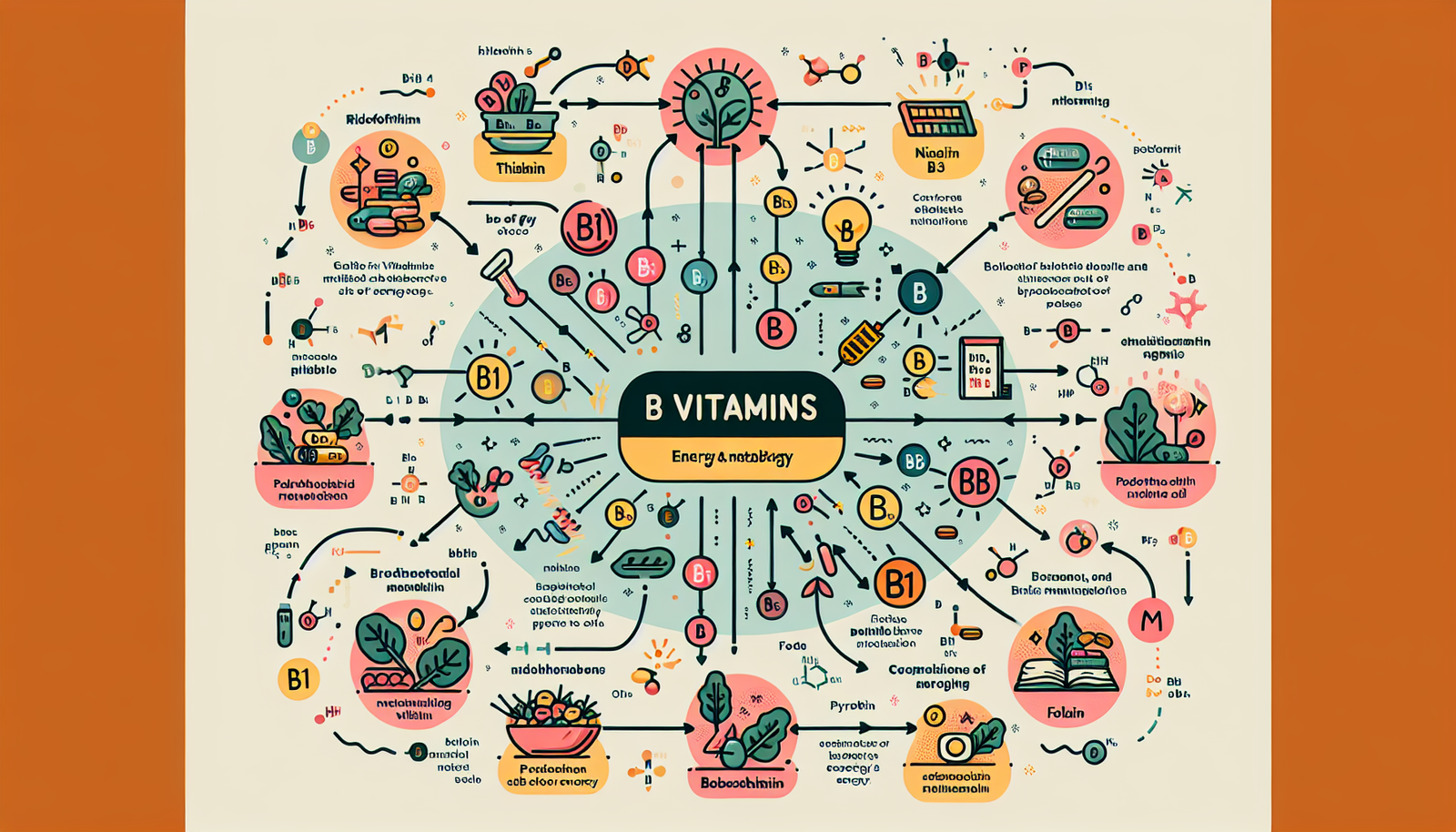
The Role of B Vitamins in Energy and Metabolism
B vitamin supplements play a vital role in energy production and metabolism, acting as essential catalysts in converting nutrients into energy. Did you know that without adequate B vitamins, the body’s ability to generate energy from carbohydrates, fats, and proteins is significantly impaired? This overview will explore how B vitamins, such as B1, B12, and others, contribute to metabolic processes and overall vitality. Understanding these vitamins’ importance can empower individuals to make informed choices about their health. Stay with us as we delve into the specific functions and benefits of these critical nutrients, shedding light on how they support energy levels and metabolic health.
Understanding the Importance of B Vitamins in Energy Production
B vitamins play a crucial role in energy production. They act as coenzymes in numerous biological processes, aiding in the conversion of food into energy. These vitamins are essential for maintaining vitality and overall well-being.
How B Vitamins Support Cellular Energy Metabolism
Cellular energy metabolism is the foundation of our energy levels. B vitamins are vital in this process, helping convert nutrients into adenosine triphosphate (ATP), the primary energy currency of cells. They act as co-factors in enzyme reactions that facilitate the breakdown of carbohydrates, fats, and proteins. Without adequate B vitamins, cells struggle to produce energy efficiently, leading to fatigue and sluggishness.
The Role of B Vitamins in the Krebs Cycle
The Krebs cycle, also known as the citric acid cycle, is a critical metabolic pathway. B vitamins are necessary for this cycle to function optimally. Specifically, vitamins B1, B2, and B3 support various enzymes in the Krebs cycle, helping generate ATP. This process is essential for sustaining energy production in cells. A deficiency in any of these vitamins can disrupt the cycle, impairing energy production.
B Vitamins and Their Impact on Mitochondrial Function
Mitochondria are the powerhouses of our cells, responsible for generating most of the cellular energy. B vitamins are integral to mitochondrial function. They help protect mitochondria from damage and ensure efficient energy production. B vitamins like B6, B9, and B12 support mitochondrial health, promoting optimal energy levels and reducing oxidative stress.
Essential B Vitamins for Optimal Metabolic Function
For peak metabolic performance, certain B vitamins are indispensable. They assist in breaking down food into energy, supporting vital bodily functions. Understanding their benefits can help maintain energy levels and overall health.
The Benefits of Vitamin B1 (Thiamine) for Energy Levels
Vitamin B1, or thiamine, is vital for energy production. It plays a significant role in converting carbohydrates into energy. Thiamine also supports nerve function and muscle health. A deficiency in B1 can lead to fatigue, weakness, and even neurological issues. Including thiamine-rich foods like whole grains, nuts, and seeds in your diet can help sustain energy levels.
Vitamin B2 (Riboflavin) as a Key Player in Metabolism
Riboflavin, or vitamin B2, is essential for metabolic processes. It assists in breaking down proteins, fats, and carbohydrates to produce energy. Riboflavin also acts as an antioxidant, protecting cells from damage. Foods rich in riboflavin include eggs, dairy products, and leafy greens. Ensuring adequate intake of B2 can help maintain metabolic health and energy balance.
How Vitamin B3 (Niacin) Enhances Energy Production
Niacin, or vitamin B3, is crucial for energy metabolism. It helps convert nutrients into energy, supporting numerous biochemical reactions in the body. Niacin also aids in DNA repair and the production of stress hormones. Deficiency in B3 can lead to fatigue and digestive issues. Incorporating niacin-rich foods like chicken, tuna, and mushrooms can boost energy levels and overall health.
Maximizing the Benefits of B Vitamin Supplements
While a balanced diet can provide essential B vitamins, supplements can offer additional support. Choosing the right formulation and timing can enhance energy and overall health. Understanding potential side effects ensures safe supplementation.
Choosing the Right B Vitamin Complex for Your Needs
When selecting a B vitamin supplement, consider your specific health needs. A B complex supplement offers a balanced blend of all essential B vitamins. It’s crucial to check for quality and bioavailability. Look for supplements with active forms of B vitamins, such as methylcobalamin for B12. Consulting with a healthcare provider can help tailor the supplement to your individual needs.
The Best Time to Take B Vitamins for Enhanced Energy
Timing matters when taking B vitamin supplements. Taking them in the morning with a meal can maximize absorption and energy benefits. B vitamins can have a stimulating effect, so taking them later in the day might interfere with sleep. Consistency in timing helps maintain stable energy levels throughout the day.
Potential Side Effects of B Vitamin Supplements and How to Avoid Them
While generally safe, B vitamin supplements can cause side effects in some individuals. High doses may lead to nausea, diarrhea, or skin reactions. To minimize risks, follow recommended dosages and opt for high-quality brands. Monitoring how your body responds to supplements and consulting a healthcare provider can help address any adverse effects.
Conclusion
B vitamin supplements are often used to address deficiencies and support overall health. They play a significant role in energy production, brain function, and cell metabolism. Deficiencies in B vitamins can lead to symptoms like fatigue, anemia, or cognitive issues. While most people obtain adequate B vitamins from their diet, certain groups may benefit from supplementation. It’s important to consult a healthcare provider before starting any new supplement regimen.
FAQ
What are the health benefits of taking B vitamin supplements?
B vitamin supplements boost overall health by supporting the nervous system, enhancing brain function, and promoting heart health. They also play a crucial role in red blood cell production, helping to reduce fatigue.
How do B vitamin supplements support energy levels?
B vitamins help convert the food you eat into energy. This conversion process enhances energy levels, allowing you to maintain vitality throughout the day.
Are B vitamin supplements effective for improving mood and mental clarity?
Yes, B vitamins can positively impact mood and cognitive functions. They aid neurotransmitter production, which can improve mental clarity and reduce symptoms of depression and anxiety.
What is the recommended dosage for B vitamin supplements daily?
The recommended dosage varies depending on age, gender, and health conditions. Generally, adhering to the guidelines on the supplement’s packaging or consulting with a healthcare provider ensures you get the right amount.
Can B vitamin supplements help with hair growth and skin health?
B vitamins, particularly B7 (biotin), are known for promoting healthy hair and skin. They contribute to stronger hair growth and can improve skin texture.
Are there any side effects or risks associated with taking B vitamin supplements?
While B vitamins are generally safe, excessive intake can lead to side effects like nausea or digestive issues. It’s important to stick to recommended doses and consult with a healthcare provider if you have underlying health concerns.











